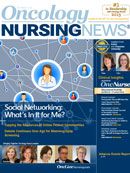Screening for Depression in Patients Receiving Radiation Therapy
Depression in cancer patients often goes unrecognized. Depression can be related to cancer-related factors, cancer treatment-related factors, underlying psychiatric history, and social factors.
Katherine Yeager, PhD, RN
Research Assistant Professor
Depression in cancer patients often goes unrecognized. Depression can be related to cancer-related factors, cancer treatment-related factors, underlying psychiatric history, and social factors. Some groups are particularly vulnerable, such as cancer patients with advanced disease. Depression prevalence estimates vary, depending on how it is assessed, and range from 5% to 16% in outpatients, 4% to 14% in inpatients, 4% to 11% in mixed outpatient and inpatient samples, and 7% to 49% in palliative care.1
Certain types of cancer are also associated with an increased occurrence of depression. For instance, patients with lung, hematologic, and gynecologic cancers show higher rates of psychological distress when compared with other cancer types. In general, women report more depression than men. Younger age is associated with higher rates of depression.2 Clinicians working with individuals with cancer recognize that depression is sometimes undiagnosed and untreated. Fortunately, opportunities to improve screening are available.
Approximately half of all new cancer patients receive radiation therapy (RT), which is usually delivered on an outpatient basis through cancer treatment centers on a Monday-to-Friday schedule over 2-8 weeks. This setting provides a valuable opportunity for screening and intervening for psychological distress, but screening procedures must be accurate and time-efficient. Prompt recognition and effective treatment of depression are of critical importance for improving the cancer patient’s quality of life, and possibly improving treatment adherence. Using screening tools and raising awareness about depression is an important step.
Cancer patients receiving RT who are potentially suffering from depression can be effectively identified by a two-item questionnaire, according to research recently presented at the 55th Annual Meeting of the American Society for Radiation Oncology.3 The Radiation Oncology Therapy Group (RTOG) Community Clinical Oncology Program (CCOP)-supported multi-institutional study screened 455 patients receiving radiation treatment at 37 centers around the United States. Participants in the study were seeking treatment for breast cancer (45%); GI cancer (11%); lung cancer (10%); gynecologic cancer (6%); or other cancers (27%). Sixty-six percent of the patients in the trial (298) were women.
Depression screenings were performed before or within 2 weeks of treatment of the initial cancer diagnosis. The screening forms included the single-item National Comprehensive Cancer Network-Distress Thermometer (NCCN-DT); the Hopkins Symptom Checklist (HSCL-25); and the nine-item Patient Health Questionnaire (PHQ- 9), which includes Patient Health Questionnaire-2 (PHQ-2) as its first two questions. All of the study participants answered the screening questionnaires with 100% completion.
Patients received the PHQ-9 and were asked if, within the past 2 weeks, they had “little interest or pleasure in doing things,” or if they were “feeling down, depressed or hopeless.” It was discovered that patients’ responses to these two questions (the PHQ-2) were as useful in identifying depression as results from the entire PHQ-9, and were more indicative of depression than results from the NCCN-DT.
Seventy-five patients (16%) in the study screened positively for depressive symptoms on the PHQ-9. The PHQ9 and PHQ-2 had similar accuracy in detecting patient-reported depression and were superior to the HLSC-25 and the NCCN-DT. Patients who screened positive for self-reported depressive symptoms were administered the Structured Clinical Interview for DSM-IV (SCID) Mood Disorder modules by trained clinical psychologists by telephone. Among those who screened positive on the PHQ-9, 20% (n = 14) met SCID criteria for major depression. Overall, the prevalence of major depression was 3% in this sample. The study determined that screening in an RT setting was well-received by patients and feasible. In addition, of the RT facilities included in the study, 68% offer mental health services.
The PHQ-2, comprising the first two items of the PHQ-9, inquires about the degree to which an individual has experienced depressed mood and anhedonia over the past 2 weeks. Its purpose is not to establish final diagnosis or to monitor depression severity, but rather to screen for depression. Patients who screen positive should be further evaluated with the PHQ-9 and/or SCID to determine whether they meet criteria for a depressive disorder.4
“Asking cancer patients about depression should be part of every cancer nurse’s practice,” said Deborah Bruner, RN, PhD, FAAN. “The ability of a simple and effective two-question survey to effectively screen for depression will hopefully prompt more nurses to screen for depression and refer patients in need of mental health services.” Bruner is senior author of the study and Professor at the Nell Hodgson Woodruff School of Nursing at Emory University in Atlanta, Georgia, where she holds the Robert W. Woodruff Chair in Nursing. She is also the Associate Director of Outcomes Research at the Winship Cancer Institute of Emory University, and has worked for over two decades with RTOG with a focus on incorporating patientreported outcomes into national clinical trials.
References
- Walker J, Holm Hansen C, Martin P, et al. Prevalence of depression in adults with cancer: a systematic review. Ann Oncol. 2013:24(4:895-900.
- Linden W, Vodermaier A, Mackenzie R, Greig D. Anxiety and depression after cancer diagnosis: prevalence rates by cancer type, gender, and age. J Affect Disord. 2012;141(2-3):343-351.
- Small W, Pugh S, Wagner L, et al. RTOG 0841: Two-Item Questionnaire Effectively Screens for Depression in Cancer Patients Receiving Radiotherapy. Presented at: American Society for Radiation Oncology 2013 Annual Meeting; September 22-25, 2013; Atlanta, Georgia.
- American Psychological Association. Patient Health Questionnaire. http://www.apa.org/pi/about/publications/caregivers/practicesettings/ assessment/tools/patient-health.aspx. Accessed October 24, 2013.

Nursing Perspectives on Managing Toxicities With ADCs in Metastatic Gastric and Breast Cancers
September 1st 2022In this episode of "The Vitals," Sarah Donahue, MPH, NP, AOCNP; Jamie Carroll, APRN, CNP, MSN; Theresa Wicklin Gillespie, PhD, MA, RN, FAAN; and Elizabeth Prechtel-Dunphy, DNP, RN, ANP-BC, AOCN, exchange clinical pearls for treating patients receiving antibody-drug conjugates.




